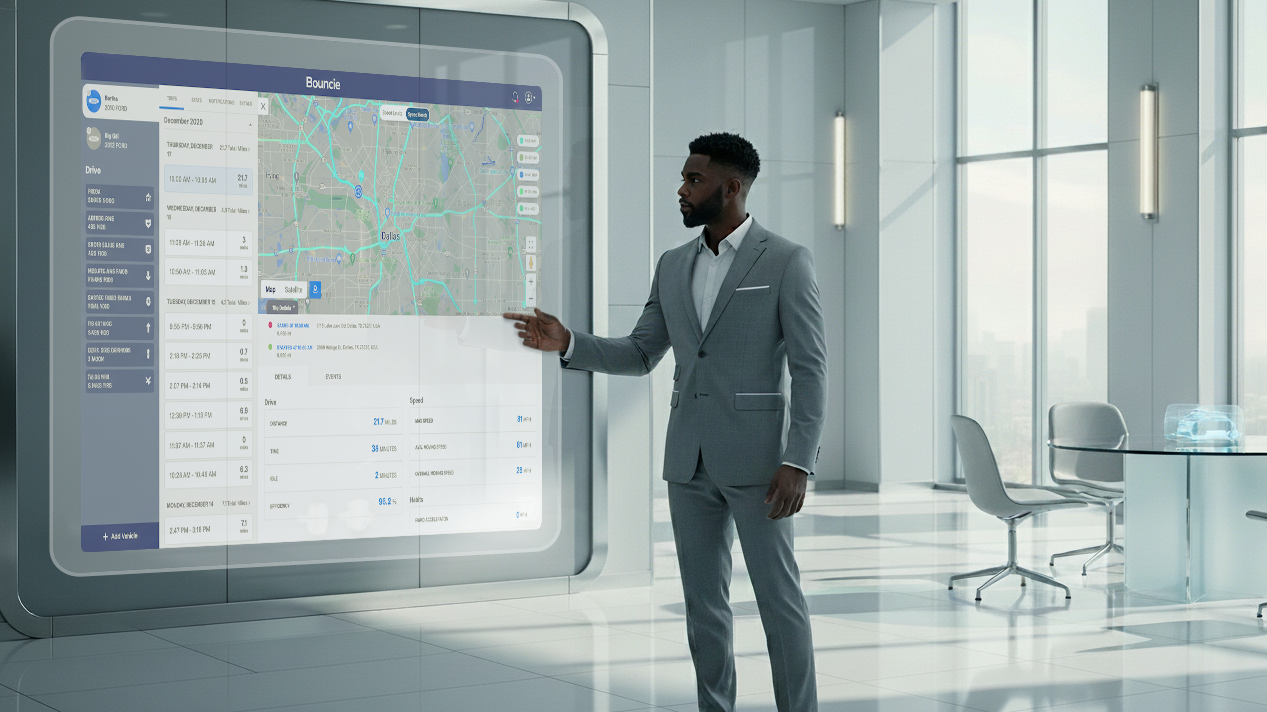GPS Tracking for Cars: Prioritizing Safety Over Surveillance

Everything from grocery delivery to ride-sharing now relies on location technology, so it’s no surprise that GPS tracking for cars is becoming more common for everyday drivers, parents, and business owners. In fact, more people are searching the web for the term “GPS surveillance for cars” than ever before. This phrase suggests a growing interest, but also carries a few misconceptions, so let’s address that upfront.
Yes, the word “surveillance” can sound ominous. It calls to mind secrecy, spying, or privacy invasion. But when it comes to vehicle GPS tracking, this is rarely the goal. People are searching for safety, accountability, and peace of mind. Whether you’re keeping an eye on a new teen driver or managing a fleet of service vehicles, GPS vehicle tracking can be a powerful tool for improving security and strengthening trust.
Think about the last time you handed the keys to your teenager and waited anxiously to hear they arrived safely, or the moment you realized one of your service vehicles hadn’t checked in and customers were calling. Whether you’re a parent or managing a fleet, that uncertainty sticks with you. These aren’t hypothetical worries, they’re everyday stressors. They’re exactly why more people are turning to GPS tracking as a way to stay informed and reduce uncertainty.
How GPS Tracking Works
Most modern GPS trackers for vehicles work by combining satellite signals and cellular data to monitor a vehicle’s location in real time. The GPS receiver determines the car’s coordinates, while the cellular connection transmits that data to an app or web dashboard.
There are two main types of GPS tracking devices:
- Real-Time GPS Trackers: These provide continuous updates every few seconds, letting you see exactly where your vehicle is at any moment.
- Passive GPS Data Loggers: These store location data internally and require you to download the data later. They don’t offer real-time insights.
Most consumers today choose real-time tracking for its convenience, especially when paired with app features like:
- Driver route history
- Speed alerts
- Trip notifications
- Geofencing
Some GPS tracking devices take this one step further with additional vehicle health and driver behavior insights.
Most trackers combine GPS satellite triangulation with 4G LTE cellular networks. That means your car’s position is captured by satellite and then transmitted to your phone or app interface via mobile data, similar to sending a text message. Real-time trackers often update every few seconds, while passive loggers store the data until you manually upload it. It’s worth noting that the GPS itself isn’t what costs money. It’s the cellular connection that powers real-time visibility and alerts and that’s why service plans vary.
Why the Term 'GPS Surveillance' Can Be Misleading
When people hear “surveillance,” they often think of secretive monitoring or hidden cameras. But that’s not how most GPS tracking is used. In fact, the majority of drivers and businesses that use GPS trackers do so with full transparency and consent. Parents install trackers to protect their teens, not spy on them. Fleet managers use trackers to improve routing and reduce fuel costs, not to micromanage employees.
Let’s reframe it: This isn’t about surveillance. It’s about trust, responsibility, and knowing the people and vehicles you care about are safe.
When used ethically, vehicle GPS tracking promotes better communication and more responsible driving habits. The best systems make it easy to share visibility with the right people without making anyone feel watched.
Core Benefits of GPS Tracking
GPS tracking offers tangible advantages for both families and businesses.
For Parents of Teen Drivers
A vehicle tracker gives you more than just a map, it gives you peace of mind. Know when your teen arrives at school or work. Get alerts if they’re speeding or driving aggressively. Use trip history to coach safer habits with real-world examples. It’s a conversation starter, not a control tactic.
For Small Business Owners and Fleets
GPS tracking is revolutionizing fleet management by helping to reduce downtime, optimize routes, and provide better service. It also gives you a record of driver behavior, helping you reward safe habits and identify training needs.
For Emergency Situations
In the event of a breakdown or accident, GPS tracking can help family members or dispatchers locate a vehicle instantly. With GPS trackers even have impact detection automatically sends alerts to designated contacts.
For Tracking Vehicle Usage
Access to trip history, mileage logs, and monitoring driving behavior insights helps both families and business owners stay informed. Whether you’re splitting fuel costs or analyzing productivity, GPS tracking turns vehicle use into actionable data.
Privacy and Data Ethics
The power of GPS tracking comes with responsibility. It’s essential to use these tools legally and respectfully and that starts with consent. If you’re using a tracker in a family car or a company vehicle, make sure drivers know it’s there and why. Open conversations lead to trust, and trust leads to safer, more cooperative behavior.
Open dialogue is key. For parents, introducing a GPS tracker to a teen driver can start with empathy: “I trust you. I just want tools to support you as you gain more experience.” For fleet managers, it’s about alignment: “This helps us plan routes better and avoid vehicle issues before they start.” When people understand that the purpose is safety and efficiency, not surveillance, they’re more likely to embrace it.
Also, choose a service that prioritizes data security. Reputable platforms will encrypt your data, keep detailed access logs, and make it easy to manage who sees what. They also don’t sell your data to third parties, which is a critical difference in today’s privacy-aware environment.
Why Battery-Powered Trackers Often Fall Short
Battery-powered GPS devices are often designed with stealth and short-term surveillance in mind. They’re compact, easy to hide, and appealing for situations where discretion matters more than reliability. But for parents and fleet owners who value ongoing visibility and trust, these devices can fall short when it matters most.
Here’s what users frequently report:
- Short battery life, especially with real-time tracking enabled
- Devices falling off or getting dislodged during driving
- Bare-bones apps with poor customer support
- Limited functionality beyond basic location tracking
Because they rely on internal batteries, many portable trackers enter sleep mode or disconnect altogether without warning. This causes delays, tracking gaps, or complete data loss.
Compare that with a plug-in solution that connects directly to your car’s OBD2 port (the same one mechanics use). It draws constant power, requires no charging, and never “goes dark.”
Introducing Bouncie: GPS Tracking Without the Creep Factor
If the idea of “GPS surveillance for cars” makes you uneasy, Bouncie is exactly the type of solution that puts those fears to rest. Bouncie is a smart, OBD-connected GPS tracking device built for transparency, not secrecy. It’s designed for people and businesses who need to stay informed, not intrude.
Features That Families Love
- Real-time location tracking
- Driving behavior alerts (speeding, hard braking, acceleration)
- Trip summaries and mileage logs
- Geo-Zones and curfews for teen drivers
- Crash detection and emergency contacts
Explore Bouncie for families: Bouncie.com/Family
Features That Fleet Managers Trust
- Multi-vehicle dashboards
- Maintenance and diagnostics tracking
- Route planning and driving scorecards
- Custom alerts and team access
Explore Bouncie for fleets: Bouncie.com/Fleet
Whether you're a parent, have a car-sharing business, or a manage a fleet, Bouncie helps you make data-driven decisions that improve safety and reduce stress.
Inside the App: What You’ll See and How It Helps
The value of GPS tracking goes beyond location. With a well-designed app like Bouncie’s, you gain daily tools that help you drive smarter, communicate better, and manage your vehicle with confidence.
Here’s what users love:
- Live Map View: See your vehicle's current location and trip progress in real time
- Trip History: Scroll through previous trips with date, time, distance, speed, and route details
- Driving Behavior Data: Visual breakdowns of speeding, hard braking, and acceleration events help you (or your drivers) adjust habits
- Geo-Zone Management: Easily set up and label virtual boundaries like “Home,” “Office” or “Service Area”
- Vehicle Health Alerts: From low battery warnings to engine diagnostic codes, Bouncie keeps you ahead of potential issues
The mobile app (iOS | Android) and online portal are easy to navigate, with data clearly visualized and customizable alerts available with just a few taps. You’re not stuck sifting through raw numbers. You’re getting meaningful, actionable insight at a glance.
Final Thoughts: Tracking Is Not the Enemy
It’s understandable that terms like “surveillance” make some people wary. But with the right tools, used the right way, GPS tracking can be one of the most empowering technologies available to vehicle owners today. It’s not about watching people. It’s about looking out for them.
Used ethically and transparently, GPS vehicle tracking helps you protect what matters most: your family, your business, and your peace of mind.
Ready to track smarter?
Discover how Bouncie makes vehicle monitoring safer, simpler, and more respectful at Bouncie.com



